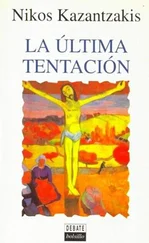Nikos Kazantzakis - Zorba The Greek
Здесь есть возможность читать онлайн «Nikos Kazantzakis - Zorba The Greek» весь текст электронной книги совершенно бесплатно (целиком полную версию без сокращений). В некоторых случаях можно слушать аудио, скачать через торрент в формате fb2 и присутствует краткое содержание. Жанр: Современная проза, на английском языке. Описание произведения, (предисловие) а так же отзывы посетителей доступны на портале библиотеки ЛибКат.
- Название:Zorba The Greek
- Автор:
- Жанр:
- Год:неизвестен
- ISBN:нет данных
- Рейтинг книги:3 / 5. Голосов: 1
-
Избранное:Добавить в избранное
- Отзывы:
-
Ваша оценка:
- 60
- 1
- 2
- 3
- 4
- 5
Zorba The Greek: краткое содержание, описание и аннотация
Предлагаем к чтению аннотацию, описание, краткое содержание или предисловие (зависит от того, что написал сам автор книги «Zorba The Greek»). Если вы не нашли необходимую информацию о книге — напишите в комментариях, мы постараемся отыскать её.
Zorba The Greek — читать онлайн бесплатно полную книгу (весь текст) целиком
Ниже представлен текст книги, разбитый по страницам. Система сохранения места последней прочитанной страницы, позволяет с удобством читать онлайн бесплатно книгу «Zorba The Greek», без необходимости каждый раз заново искать на чём Вы остановились. Поставьте закладку, и сможете в любой момент перейти на страницу, на которой закончили чтение.
Интервал:
Закладка:

Nikos Kazantzakis
Zorba The Greek
© 1946
Translated By Carl Wildman

1
I FIRST MET HIM in Piraeus. I wanted to take the boat for Crete and had gone down to the port. It was almost daybreak and raining. A strong sirocco was blowing the spray from the waves as far as the little café, whose glass doors were shut. The café reeked of brewing sage and human beings whose breath steamed the windows because of the cold outside. Five or six seamen, who had spent the night there, muffled in their brown goatskin reefer-jackets, were drinking coffee or sage and gazing out of the misty windows at the sea. The fish, dazed by the blows of the raging waters, had taken refuge in the depths, where they were waiting till calm was restored above. The fishermen crowding in the cafés were also waiting for the end of the storm, when the fish, reassured, would rise to the surface after the bait Soles, hog fish and skate were returning from their nocturnal expeditions. Day was now breaking.
The glass door opened and there entered a thick-set, mud-bespattered, weather-beaten dock laborer with bare head and bare feet.
"Hi! Kostandi!" called out an old sailor in a sky-blue cloak. "How are things with you?"
Kostandi spat. "What d'you think?" he replied testily. "Good morning-the bar! Good night-my lodgings! That's the sort of life I'm leading. No work at all!"
Some started laughing, others shook their heads and swore.
"This world's a life sentence," said a man with a moustache who had picked up his philosophy from the Karagiozis [1]theater. "Yes, a life sentence. Be damned to it."
A pale bluish-green light penetrated the dirty windowpanes of the café and caught hands, noses and foreheads. It leapt on to the counter and lit the bottles. The electric light faded, and the proprietor, half-asleep after his night up, stretched out his hand and switched it off.
There was a moment's silence. All eyes were turned on the dirty-looking sky outside. The roar of the waves could be heard and, in the café, the gurgling of a few hookahs.
The old sailor sighed: "I wonder what has happened to Captain Lemoni? May God help him!" He looked angrily at the sea, and growled: "God damn you for a destroyer of homes!" He bit his grey moustache.
I was sitting in a corner. I was cold and I ordered a second glass of sage. I wanted to go to sleep, but I struggled against the desire to sleep, and against my fatigue and the desolation of the early houis of dawn. I looked through the steamy windows at the awakening port resounding with the ships' sirens and the cries of carters and boatmen. And, as I looked, an invisible net, woven from sea, air, and my departure, wound its tight meshes round my heart.
My eyes were glued to the black bows of a large vessel. The whole of the hull was still engulfed in darkness. It was raining and I could see the shafts of rain link sky and mud.
I looked at the black ship, the shadows and the rain, and my sadness took shape. Memories arose. The rain and my spleen took on, in the humid atmosphere, the features of my great friend. Was it last year? In another life? Yesterday? When was it I came down to this same port to say goodbye to him? I remembered how it rained that morning, too, and the cold, and the early light. At that time also, my heart was heavy.
How bitter it is to be slowly separated from great friends! Far better make a clean break and remain in solitude-the natural climate for man. And yet, in that rainy dawn, I could not leave my friend. (I understood why later, but, alas, too late.) I had gone on board with him and was seated in his cabin amid scattered suitcases. I gazed at him intently for a long time, when his attention was fixed elsewhere, as if I wished to make mental note of his features, one by one-his bluish-green, luminous eyes, his rounded, youthful face, his intelligent and disdainful expression, and, above all, his arístocratic hands with their long, slender fingers.
Once he caught me gazing lingeringly and eagerly at him. He turned round with that mocking air he assumed when he wanted to hide his feelings. He looked at me and he understood. And to avoid the sadness of separation, he asked with an ironical smile:
"How long?"
"What d'you mean, how long?"
"How long are you going on chewing paper and covering yourself with ink? Why don't you come with me? Away there in the Caucasus there are thousands of our people in danger. Let's go and save them." He began to laugh as if in mockery of his noble plan. "Maybe, we shan't save them. Don't you preach: 'The only way to save yourself is to endeavor to save others?'… Well, forward, master. You're good at preaching. Why don't you come with me!"
I did not answer. I thought of this sacred land of the East, the old mother of the gods, the loud clamoring of Prometheus nailed to the rock. Nailed to these same rocks, our own race was crying out. Again it was in peril. It was calling to its sons for help. And I was listening, passively, as if pain was a dream and life some absorbing tragedy, in which nobody but a boor or a simpleton would rush onto the stage and take part in the action.
Without waiting for an answer, my friend rose. The boat sounded its siren for the third time. He gave me his hand and again hid his emotion in raillery.
"Au revoir, bookworm!"
His voice trembled. He knew it was shameful not to be able to control one's feelings. Tears, tender words, unruly gestures, common familiarities, all seemed to him weaknesses unworthy of man. We, who were so fond of each other, never exchanged an affectionate word. We played and scratched at each other like wild beasts. He, the intelligent, ironical, civilized man; I, the barbarian. He exercised self-control and suavely expressed all his feelings in a smile. I would suddenly utter a misplaced and barbarous laugh.
I also tried to camouflage my emotions with a hard word. But I felt ashamed. No, not exactly ashamed, but I didn't manage it. I grasped his hand. I held it and wouldn't let it go. He looked at me, astonished.
"Are you so moved?" he said, trying to smile.
"Yes," I replied, with calm.
"Why? Now, what did we say? Hadn't we agreed on this point years ago? What do your beloved Japs say? Fudoshin! Ataraxia, Olympian calm, the face a smiling, unmoving mask. As for what happens behind the mask, that is our business."
"Yes," I replied again, trying not to compromise myself by embarking on a long sentence. I was not sure of being able to control my voice.
The ship's gong sounded, driving the visitors from the cabins. It was raining gently. The air was filled with pathetic words of farewell, promises, prolonged kisses, and hurried, breathless injunctions. Mothers rushed to sons, wives to husbands, friends to friends. As if they were leaving them forever. As if this little separation recalled the other-the Great Separation. And suddenly, in the humid air, the sound of the gong echoed softly from stem to stern, like a funeral bell. I shuddered.
My friend leaned over.
"Listen," he said in a low voice. "Have you some foreboding?"
"Yes," I replied once more.
"Do you believe in such humbug?"
"No," I answered with assurance.
"Well, then?"
There was no "well." I did not believe in it, but I was afraid.
My friend lightly touched my knee with his left hand, as he was wont to do in moments of abandon. I would urge him to take a decision, he would oppose this, stopping his ears, and refuse; finally he would accept, and then he would touch my knee, as if to say: "All right, I'll do what you say, for friendship's sake…"
Читать дальшеИнтервал:
Закладка:
Похожие книги на «Zorba The Greek»
Представляем Вашему вниманию похожие книги на «Zorba The Greek» списком для выбора. Мы отобрали схожую по названию и смыслу литературу в надежде предоставить читателям больше вариантов отыскать новые, интересные, ещё непрочитанные произведения.
Обсуждение, отзывы о книге «Zorba The Greek» и просто собственные мнения читателей. Оставьте ваши комментарии, напишите, что Вы думаете о произведении, его смысле или главных героях. Укажите что конкретно понравилось, а что нет, и почему Вы так считаете.












